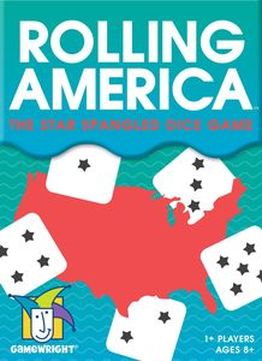 What is this game about? Rolling America is a simple yet challenging roll and write game in which you are given eight rounds to place numbers in as many U.S. states as possible. The catch? States can only be within one number of every other state whose borders they touch (e.g. if one state has a 4 in it, you can put a 3, 4, or 5 in a neighboring state). Each round, you'll roll six of seven dice, two at a time. Each die color corresponds to a different region of the country, and you can place numbers in the regions that match your die colors. You will quickly find yourself stuck, although it is definitely possible to maximize your progress by making use of special skills in the game. There are three special powers, each of which can be used three times per game. The "dupe" ability allows you to duplicate a number you just rolled. The "guard" ability allows you to fill a state with a number even if it's not a legal placement. And "color change" allows you to treat a die as any color on the map. If you can't place a number in a state space, you fill it with an X. Your final score at the end of the game is the number of Xs on your map—a number you want to be as low as is humanly possible! How does it play solo? Rolling America is a roll and write that has no player interaction. The solo version of the game plays exactly like the multiplayer, except it's your own score that you're trying to beat from game to game. 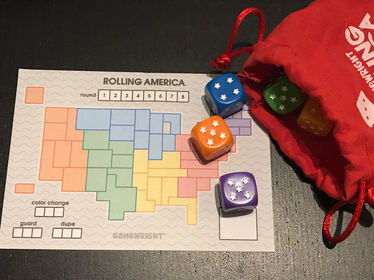 Overall Thoughts Rolling America is good for what it is. I paid about $8 for it, and the entire game comes in a tiny box that easily fits into a purse or backpack. (Although you'll need to have your own separate writing utensil.) It's ultimately a luckfest, but making smart choices and maximizing your use of special powers can have a big impact on your score. Rolling America is quick, portable, and easy-to-teach, all of which are pros. However, I wouldn't say it's the best roll and write I have played to date. It is definitely pleasant and engaging, but it doesn't have the same addictive quality that my favorite roll and writes have. (For example, I'm crazy about The Castles of Burgundy: The Dice Game, and will basically never say no to a game of it.) Do I recommend it? Yes, but it's not a must buy. If you're looking for the ultimate combination of cheap, affordable, and entertaining—and especially if you like roll and writes--Rolling America may be for you. But I think there are better options out there. Overall Rating: 3 stars 5 stars — I love it! 4 stars — I really like it. 3 stars — I like it. 2 stars — It's okay. 1 star — Meh.
0 Comments
 SPOILER ALERT: It's another unexciting week on Kickstarter. But you know what? That's okay, because it's not like I don't have a bunch of other interesting things to play at home. Here are three games I am dying to get off of my "shelf of shame." (I prefer to think of it as a shelf of excitement!) 1. Thunderbolt Apache Leader I recently picked up a copy of this, and I am so so so excited to give it a try. In it, you are controlling an air support team in a number of different situations and campaigns around the world. You'll have several choices about how best to complete different missions, and your pilots are able to level up as you go. But you also have to use your pilots wisely, because planes that are too damaged will have to sit out the next mission, so you have to distribute your people strategically. Thunderbolt: Apache Leader looks like such a cool game, and I'm anxious to get it to the table soon. 2. Republic of Rome I was so excited to find an unpunched copy of the old Avalon Hill edition of this game, and I've done plenty of reading about it... but I have yet to actually play a game of Republic of Rome. It's an old, but apparently good, semi-cooperative game in which players are vying for dominance in the Roman Empire, but also trying to prevent the Empire from coming apart. There are some bots that let you play the game solo. I am hoping to sink my teeth into this one soon and find out whether I have it in me to balance the interests of the Empire as a whole with my own senatorial ambitions! 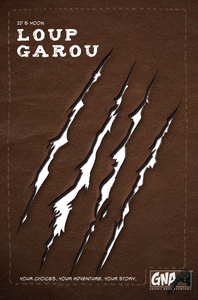 3. Loup Garou Loup Garou is one of the books released in the Graphic Novel Adventures set from Van Ryder Games, and it's the one I have been most excited to play. I need to get my life together and get a game of this going. It's an adventure in which you have been turned into a werewolf, and you're trying to figure out how to survive. I am expecting an awesome experience. 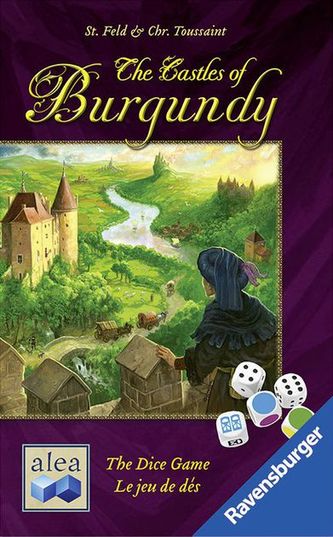 What is this game about? Like its parent, The Castles of Burgundy, and its small-box sibling, The Castles of Burgundy: The Card Game, The Castles of Burgundy: The Dice Game is all about scoring victory points by building up an estate. The dice game, however, is a roll and write game in which you roll dice and combine them to fill in as many hexes on your estate as you can. The game comes with four different estates, each with a different hex pattern—which means that once you come up with favorite strategies for one of the estates, you can try another. On each turn, you will roll five six-sided dice. Two of them are "normal" dice, two of them are dice with a different color on each face (to match different hex colors), and one is a timer that puts pressure on you to finish your business before the game ends. Only certain pip numbers can be combined with certain colors, so part of your turn is seeing if you've rolled a valid pair. The other, more important part is acquiring and using dice manipulation powers that help you achieve your goals in the game even when the dice aren't on your side. You can score for finishing all neighboring hexes of the same color (i.e. creating combos like in the base and card games), as well as for selling off goods and for filling in all hexes of the same color on the entire map. You are also rewarded for achieving combos earlier in the game—there are diminishing returns for late-game achievements. How does it play solo? Because this game is a typical roll and write, there is no player interaction, so the solo game plays almost exactly like the regular game. There is one minor difference: There are exactly eight turns in each of the game's three rounds, regardless of what you roll on the timer die. The Castles of Burgundy: The Dice Game is definitely a beat-your-own-score solo game, but the satisfaction of filling in your estate sheet and using your special abilities in clever ways overcomes that for me. 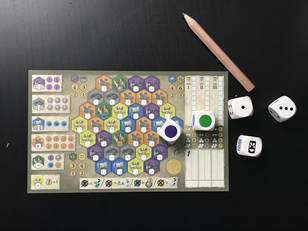 This is all you need for a good time. This is all you need for a good time. Overall Thoughts I very much enjoy The Castles of Burgundy: The Dice Game. You can get a copy for around $15, and you will absolutely get your money's worth. For me, this game is highly engaging, and I find myself playing it again and again in pursuit of a better score. (I laminated a few copies of each estate, so I will have reusable game sheets.) Sometimes you get unlucky and can't get good die rolls to save your life, but thinking through your options is still fun. I'd say that The Castles of Burgundy: The Dice Game is more enjoyable than the card game, and it's far faster and more compact. There is almost no setup—you just grab a pencil (they are included in the game box), choose an estate sheet, grab your dice, and go to town. The Castles of Burgundy: The Dice Game is perfect if you just want a quick game to play on a work night or lunch break. I have even played it in the waiting room at a doctor's office! Do I recommend it? Yes. The Castles of Burgundy: The Dice Game is a fun little puzzle that doesn't wear out its welcome. It's also so inexpensive that it's worth a risk if you're interested but on the fence. Overall Rating: 4 stars Rating Scale: 5 stars — I love it! 4 stars — I really like it. 3 stars — I like it. 2 stars — It's okay. 1 star — Meh. 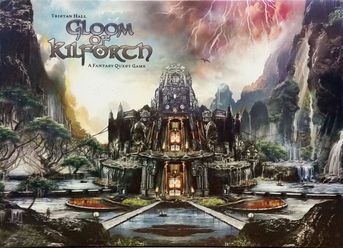 I'll be real with you: There aren't any Kickstarter campaigns that are catching my attention right now (I already wrote about Dungeon Alliance). If you're into Run, Fight, or Die, that campaign is coming to a close. I'm kind of glad, though. When there are too many Kickstarter campaigns going, I get a little stressed out. Am I getting a better deal if I back now? Would I be better off waiting for retail? ...Is it a gamble to wait for retail? As our hobby grows and the market shifts, and as the life cycle of most games grows shorter, it's hard to decide whether something is essential or whether you should give it a miss and wait for better games. (And as a reviewer, I am always wondering which games I need to pick up for my site, since I am buying for myself but also for my potential readers.) So here are some Kickstarter projects that I personally did back, and that I'm waiting for: 1. 1066: Tears to Many Mothers and Gloom of Kilforth I am genuinely excited to play these. They were originally supposed to arrive in July 2018, but this is Kickstarter we're talking about, so I don't mind a wait. 1066 is a history-themed card game, and Gloom of Kilforth is a fantasy adventure card game. Both are from Tristan Hall, and both look very promising. 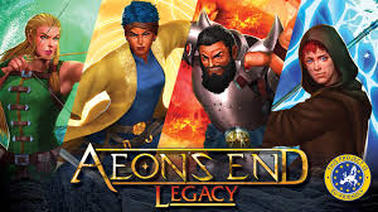 2. Aeon's End: Legacy Aeon's End may be my favorite solo deck builder, so there is always room for more of it in my collection. I can't wait to start with my own novice breach mage and help him or her develop into a total badass—a badass who can then be mixed and matched with all of the other stuff I've picked up for this game. Many hours of fun are ahead for me when that package arrives at my door! 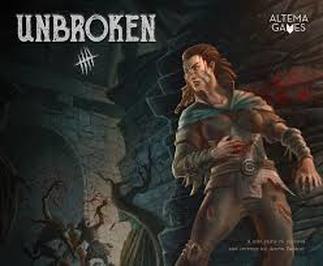 3. Unbroken I had never done work for a Kickstarter campaign until Unbroken, and I am so glad that this is the first game I chose to preview. I really like Unbroken, and I can't wait to get my very own hot-off-the-press final copy. It's good fun with a lot of focus on the solo experience, and I expect to enjoy exploring it for a good long time. 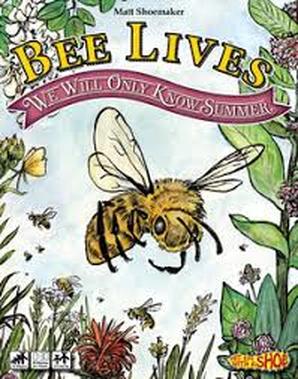 Full Disclosure: Matt Shoemaker sent me a prototype copy of Bee Lives so I could write this preview. The Kickstarter Campaign for Bee Lives can be found here. What is Bee Lives about? Bee Lives is a highly thematic worker placement game about surviving and thriving as a wild bee hive. You will need to scout for promising food and water sources, grow your hive, rob other bee hives, and defend your own home from opportunistic neighbors. You'll also have to consider actions like requeening (i.e. killing off your current queen and installing a new one), cleaning your hive because all of that foraging and robbing can expose you to some nasty mites, and swarming. If your bees get overcrowded in their hive, they will swarm—an outcome that grants victory points, but also produces a new enemy for you to fight with. Your ultimate goal is to survive the winter months with at least one worker bee still alive. You can also earn victory points, but they are essentially meaningless if your hive dies out. So throughout the game's nine rounds (representing the months from March through November), you will need to both advance your hive's immediate interests and keep an eye on the future. As the seasons go by, different areas that you have scouted provide varying amounts of honey and pollen. Additionally, a new event card each month provides additional challenges or benefits that can impact your game. It is also possible to play a multiyear campaign that allows you to nurture your hives for a longer period of time. The solo version of Bee Lives is still in development. Currently, you just play the game as normal and try to reach a high score. When you swarm, your own offshoot hives (controlled by a simple AI card) will challenge you, so you never truly play unopposed. The event cards can also stymie you and give you problems to work around as you make your hive the best it can be. I also know, however, that solo challenges are currently in development, and I am very excited about those. I am looking for something that will let me push myself harder in this game and force me to develop new and interesting strategies. Solo players will also be receiving scoring brackets that give them goals to work towards when they play the "regular" solo mode. 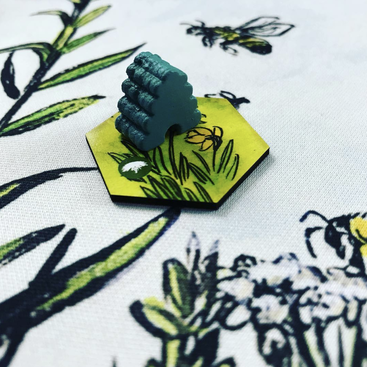 What I like about Bee Lives Bee Lives is a ton of fun to play. Although there are many actions to consider taking in the game, they are all very intuitive, because every single thing you do in Bee Lives is related to the actual lives of bees. Matt Shoemaker, the designer, is both a librarian and a beekeeper, and his passion really shows in his game. I found myself learning a LOT about bees, and really loving it! Most delightful for me was realizing just how mean those sweet little honey bees can be—one of the funnest aspects of the game is swarming, and then trying to kill your own wayward children. "Requeening" involves murdering your current queen so that you can replace her with another one. And trying to balance resources to make sure that the conditions in your hive will allow you to produce new worker bees is both fun and a good representation of what happens in nature. There are several interesting strategic choices to make when scouting, choosing which resources to take, and plotting the growth of your hive. You'll have to be good at balancing growth and acquisition with maintaining what you've already built. Possible Concerns about Bee Lives As a multiplayer game, Bee Lives is a ton of fun. The solo game is not yet complete, because the challenge cards are still in development. Without challenges and scoring brackets to help you determine how well you did, Bee Lives becomes a beat-your-own-score solo game that is highly entertaining, but that lacks the tension of playing the game with others. I have complete faith, however, that the challenges are going to be awesome. Should I Back It? If you like thematic worker placement games, as well as worker placement games that can get just a little bit mean, Bee Lives is a great choice. The combination of building your own hive, finding/blocking resources, and actively fighting with other hives makes Bee Lives more than just another euro-style game. I can't wait to get my own final copy. Play Through: 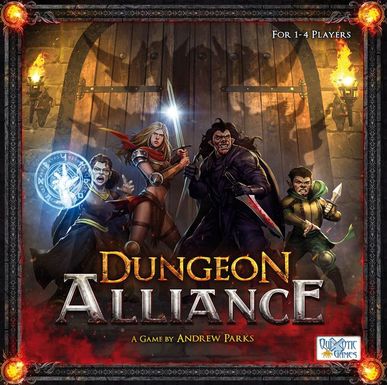 Kickstarter is still pretty slow for solo gamers right now, at least in my opinion. But there are a couple of projects I'm excited about! 1) Dungeon Alliance (Second Printing + Expansions) I am a definite fan of Dungeon Alliance, and positively reviewed the base game earlier this year. If you like deck building, puzzling out optimal moves, and building interesting teams of heroes, then Dungeon Alliance is the game for you. Now it's available for reprint, and there are some adventure pack expansions that add campaign play and additional challenges to the base game. This KS campaign also allows you to preorder rubber playmats for all player counts, which I am pumped about because that is one less step to deal with during setup. This was an instaback for me, and I look forward to having even more interesting stuff to add to my Dungeon Alliance games. I play a lot of games, and this is one of the ones I find myself thinking about and itching to get back to the table.  2. Hellenica: Story of Greece I am a sucker for all things ancient history, so I definitely want to keep an eye on this one. Hellenica is a civilization game in which you control one of several city-states and vie for power and influence throughout the Greek world. There are also several different things to focus on, so you can choose to be warlike, peaceful, pious, philosophical, or a number of other things in your quest for greatness. Some draft rules are available online, and there is definitely an AI deck that can be used to control the movements of multiple non-player city states. I'd be interested in seeing just how complex that AI is—especially since a solo player would be handling all of the upkeep. At $90 for the base game, the price is steep, and I'd want to be entirely sure I was buying an experience I really wanted. 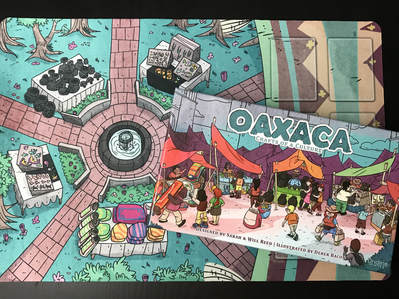 What is this game about? Oaxaca: Crafts of a Culture is a quick little engine builder about being an expert craftsperson in Oaxaca, Mexico. Your goal is to score big by creating beautiful local art to sell to tourists. Across three rounds, you will roll and manipulate dice, as well as craft pieces of artwork that will give you both points and special abilities. Each type of craft—pottery, jewelry, wood, tin, and textiles—can impact your game in interesting ways, and you'll find yourself developing new strategies each game in response to how you roll the dice. Mechanically, the game is simple: Roll your dice, and take your turns deploying them to either 1) gather materials and put crafting projects in your workshop, or 2) work on crafting your objects so that they can be placed in your market stall. Some dice are wild and allow you to take more flexible but less powerful actions. You can also make use of common "tourist cards" and the special abilities on items in your market stall to build your engine and extend your ability to take actions. The mechanics are supported by bright and beautiful art that is evocative of an actual market in Oaxaca, but without ripping off the actual work of artisans there—a real effort was made to show respect for the craftspeople who inspired this game. How does it play solo? In the solo variant of Oaxaca, turns play out more or less as they do in the multiplayer game. However, you roll an extra set of dice to reflect what types of crafts tourists want to buy, and at the end of each turn, you need to make a decision: Should you sell an item for points now, or should you hang onto it and use its special power a little longer before you do? You also have the option of hunting down cards that allow you to place wooden cubes next to certain craft decks—a move that gives you additional bonus points for selling crafts of that type. Although the solo game is a "beat your own score" type of game, the rulebook provides score ranges that give you an indication of how you did. (A lot of the time, my crafts are... unremarkable. Sigh.) The solo variant has clear rules and is a natural extension of multiplayer gameplay, which I appreciate as a solo player. 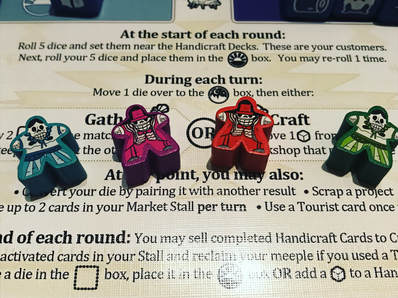 Overall Thoughts Oaxaca is a highly engaging little engine builder, and overall I like it a lot. Although you are in some ways limited by the luck of your die rolls, the game gives you plenty of options to mitigate your luck, and it definitely rewards clever gameplay. I like that Oaxaca's solo variant gives you a few different strategies to try. Will you just try to craft whatever seems best in the moment? Or will you try to specialize and gain bonus points for excellent work with a certain type of craft? Will you try to craft a lot of jewelry, which tends to give you bonus points at the end of the game? Or will you craft less point-heavy objects that give you more abilities, like dice manipulation? There are a lot of choices here, and all of them are interesting, even when they don't pay off when it comes to your final score. My one issue with Oaxaca is that, while brevity is the soul of wit, this engine builder might be just a little too short. I am intensely engaged during the game, only to find that it's already over. I only ever seem to get a taste of success, never quite revving the engine I've built as loudly as I could. I know that Sarah and Will Reed extensively playtested this game and that limiting the number of rounds was a deliberate choice. At four and five rounds, Oaxaca seems to have overextended its welcome. But I can't help wanting just a little bit more from this game. It's like an amuse bouche that you wish could be an entire meal. Do I recommend it? Yes. If you're looking for a quick engine builder with a unique theme, then Oaxaca: Crafts of a Culture is for you. It's a strong "filler with teeth." Just don't expect to be full afterwards. Overall Rating: 3.5 stars 5 stars — I love it! 4 stars — I really like it. 3 stars — I like it. 2 stars — It's okay. 1 star — Meh. |
AuthorMy name is Liz Davidson, and I play solo board games. A lot of solo board games... Archives
August 2021
Categories
All
|
 RSS Feed
RSS Feed